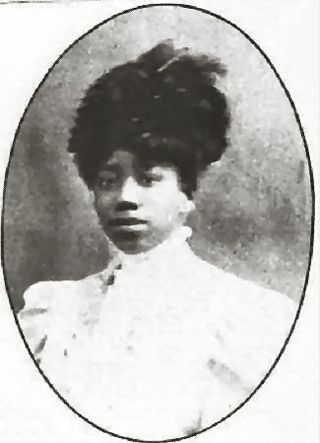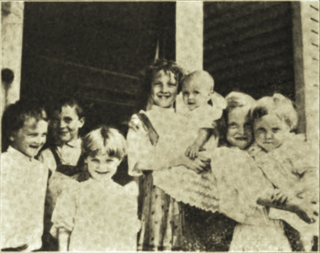
Laura Jane Addams was an American settlement activist, reformer, social worker, sociologist, public administrator, philosopher, and author. She was a leader in the history of social work and Women's suffrage. In 1889, Addams co-founded Hull House, one of America's most famous settlement houses, in Chicago, Illinois, providing extensive social services to poor, largely immigrant families. Philosophically a "radical pragmatist", she was arguably the first woman public philosopher in the United States. In the Progressive Era, when even presidents such as Theodore Roosevelt and Woodrow Wilson identified themselves as reformers and might be seen as social activists, Addams was one of the most prominent reformers.

Hull House was a settlement house in Chicago, Illinois, that was co-founded in 1889 by Jane Addams and Ellen Gates Starr. Located on the Near West Side of Chicago, Hull House, named after the original house's first owner Charles Jerald Hull, opened to serve recently arrived European immigrants. By 1911, Hull House had expanded to 13 buildings. In 1912, the Hull House complex was completed with the addition of a summer camp, the Bowen Country Club. With its innovative social, educational, and artistic programs, Hull House became the standard bearer for the movement; by 1920, it grew to approximately 500 settlement houses nationally.

Paulus Hook is a community on the Hudson River waterfront in Jersey City, New Jersey. It is located one mile across the river from Manhattan. The name Hook comes from the Dutch word "hoeck", which translates to "point of land." This "point of land" has been described as an elevated area, the location of which today is bounded by Montgomery, Hudson, Dudley, and Van Vorst Streets.
The settlement movement was a reformist social movement that began in the 1880s and peaked around the 1920s in the United Kingdom and the United States. Its goal was to bring the rich and the poor of society together in both physical proximity and social connection. Its main object was the establishment of "settlement houses" in poor urban areas, in which volunteer middle-class "settlement workers" would live, hoping to share knowledge and culture with, and alleviate the poverty of, their low-income neighbors. The settlement houses provided services such as daycare, English classes, and healthcare to improve the lives of the poor in these areas. The settlement movement also spawned educational/reform movements. Both in the UK and the US settlement workers worked to develop a unique activist form of sociology known as Settlement Sociology. This science of social reform movement is neglected in the history of sociology in favor of a teaching-, theory- and research university–based model.

Pleasant Ridge is one of the 52 neighborhoods of Cincinnati, Ohio. Annexed in 1911, the neighborhood is predominately residential. The population was 8,895 at the 2020 census.

Chicago Commons, known since 1954 as the Chicago Commons Association, is a social service organization and former settlement house in Chicago, Illinois, in the United States. Originally located on the near Northwest Side and now headquartered in Chicago's Bronzeville neighborhood, it serves underresourced communities throughout the city.
Lea Demarest Taylor was the head resident of the Chicago Commons, a settlement house in Chicago, Illinois, from 1922 to 1954. Although often overshadowed by her famous father, Graham Taylor, she made significant contributions to the settlement house movement in her own right.

Dr. Fannie Hagen Emanuel was an American medical doctor and civic leader active in Chicago over the early decades of the twentieth century. In 1908 she founded the Emanuel Settlement House in Chicago.
Ada Sophia Dennison McKinley was an American educator, settlement house worker, and activist in Chicago, Illinois. She founded the South Side Settlement House, later renamed in her honor as Ada S. McKinley Community Services. The organization continues to serve thousands in the Chicago metropolitan area, Indiana, and Wisconsin. Because of her pioneering community service work, she is hailed as a "heroine of Chicago's South Side."

Harriet Elizabeth Vittum was an American social reformer, especially active in the settlement movement in Chicago.

The College Settlements Association (CSA) was an American organization founded during the settlement movement era which provided support and control of college settlements for women. Organized February 1890, it was incorporated on January 5, 1894. The settlement houses were established by college women, were controlled by college women, and had a majority of college women as residents. The CSA was devised to unite college women in the trend of a modern movement, to touch them with a common sympathy, and to inspire them with a common ideal. It was believed that young students should be quickened in their years of vague aspiration and purely speculative energy by possessing a share in this broad practical work.

Settlement and community houses in the United States were a vital part of the settlement movement, a progressive social movement that began in the mid-19th century in London with the intention of improving the quality of life in poor urban areas through education initiatives, food and shelter provisions, and assimilation and naturalization assistance.

Rivington Street Settlement was an American settlement house which provided educational and social services on the Lower East Side of the Manhattan borough of New York City, New York. Under the auspices of the College Settlements Association (CSA), it focused on the mostly immigrant population of the neighborhood. Originally located at 95 Rivington Street (1889-), other locations later included 96 Rivington Street (1892-1901), 188 Ludlow Street (1902–), 84-86 First Street (1907-), and Summer Home, Mount Ivy, New York (1900-). The Rivington Street Settlement was established by college women, was controlled by college women, and had a majority of college women as residents. The Rivington Street Settlement was a kind of graduate school in economics and sociology, with practical lessons in a tenement–house district - a kind of sociological laboratory.

College Settlement of Philadelphia is an American outdoor camp and school located in Horsham, Pennsylvania. Established in 1892, it was originally associated with the settlement movement under the auspices of the College Settlements Association (CSA) to provide educational and social services in South Philadelphia, Pennsylvania, focusing on the mostly immigrant population of the neighborhood it served, and providing a home to the children and young people of the neighborhood.

Goodrich Social Settlement was the second settlement house in Cleveland, Ohio, after Hiram House. It organized on December 9, 1896, incorporated May 15, 1897, and opened May 20, 1897 at Bond St. and St. Clair Ave. It was established by Flora Stone Mather as an outgrowth of a boys' club and women's guild conducted by the First Presbyterian Church. Its aims were “to provide a center for such activities as are commonly associated with Christian social settlement work". It was maintained by an endowment. The Goodrich House Farm, in Euclid Point, Ohio, was part of the settlement.

University of Chicago Settlement was a settlement of the University of Chicago. It was established January, 1894, by the Philanthropic Committee of the Christian Union of the University of Chicago. Initially, two graduate students were in residence "to provide a center for educational, religious and philanthropic work." Mary McDowell became head resident September 15, 1894.

Neighborhood House was an American settlement house in Chicago, Illinois. It was opened in October 1896, by Samuel S. and Harriet M. Van Der Vaart, under the auspices of the Young People's Society of the Universalist Church, of Englewood, Chicago, and with the assistance of teachers of the Perkins, Bass, and D. S. Wentworth public schools. It was officially established in the Fall of 1897 by Harriet Van Der Vaart as the outgrowth of the kindergarten opened the year before "to bring together for mutual benefit people of different classes and conditions."
Neighborhood House is an American community center located in Louisville, Kentucky. Founded in 1896, as North Broadway Social Settlement it was renamed Neighborhood House in 1902, when it incorporated.

Lawrence House was an American social settlement in Baltimore, Maryland. Its beginnings were in 1893, when Rev. Dr. Edward A. Lawrence and a friend took up lodging at 214 Parkin Street. Lawrence died suddenly later in 1893, and in his memory, the Lawrence Memorial Association organized in 1894 and purchased a house at 816 West Lombard Street. The settlement incorporated in the Fall of 1900. In 1904, the place was enlarged by the addition of the adjoining house, 814 West Lombard Street.

South Park Settlement was an American settlement movement-era settlement established in the South Park neighborhood of San Francisco, California on January 2, 1895, by the San Francisco Settlement Association. It was founded in one of the crowded districts of San Francisco. The pretty little oval park on which the Settlement House faces was formerly the fashionable residence district of the city. But within a few blocks on either side of South Park were many little streets, whose crowded tenements furnished homes for less prosperous working people. Its goals were to establish and maintain a settlement in San Francisco as a residence for persons interested in the social and moral condition of its neighborhood; to bring into friendly and helpful relations with one another the people of the neighborhood in which the settlement was situated; to cooperate with church, educational, charitable and labor organizations, and with other agencies acting for the improvement of social conditions; to serve as a medium among the different social elements of the city for bringing about a more intelligent and systematic understanding of their mutual obligations; as well as to do social and educational work in the neighborhood; co-operate in the civic work of the city; and investigate social and economic conditions.






















